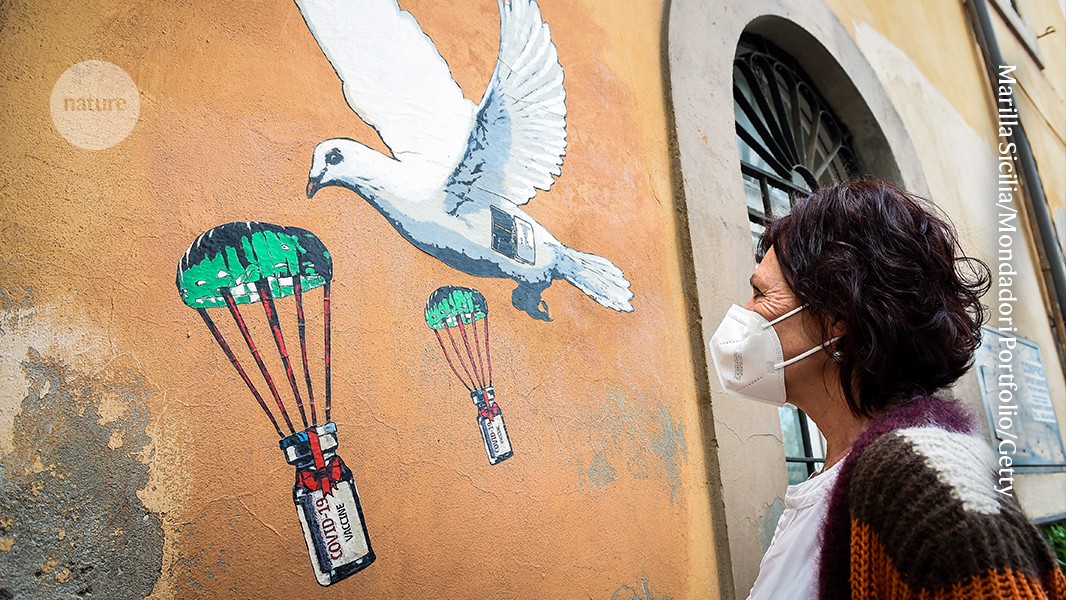Cancelling mRNA studies is the highest irresponsibility

The rest of the world is not following the US government’s dangerous path, and will stick with the technology that helped the world out of the COVID-19 pandemic

Italian street artist Harry Greb’s mural in front of Rome’s health ministry celebrating the arrival of COVID-19 vaccines in 2021.Credit: Marilla Sicilia/Archivio Marilla Sicilia/Mondadori Portfolio/Getty
A technology that played a key part in saving millions of lives during the COVID-19 pandemic1 should be feted to the skies. Instead, US health secretary Robert F. Kennedy Jr announced last week that the US federal government is terminating 22 grants worth nearly US$500 million for projects researching messenger RNA (mRNA) vaccines.
This is the technology that, in his first term (2017–21), US President Donald Trump included in Operation Warp Speed: the federal government’s $18-billion programme to procure COVID-19 vaccines for US populations in record time2. It is also the technology that is showing potential for treating cancers3, autoimmune diseases and inherited conditions such as sickle cell disease. But now, in a statement accompanying the grant cancellations, Kennedy stated that “these vaccines fail to protect effectively against upper respiratory infections like COVID and flu”. And in an article for The Washington Post, Jay Bhattacharya, director of the US National Institutes of Health, wrote that mRNA technology “failed to earn the public’s trust”, which fuelled vaccine hesitancy.
Shock and disbelief does not even begin to describe the reaction from mRNA and public-health researchers. The Alliance for mRNA Medicines, which represents companies and universities, said in a statement: “Secretary Kennedy’s unscientific and misguided vilification of mRNA technology and cancellation of grants is the epitome of cutting off your nose to spite your face.”
True words. Yet this announcement is not unexpected. Kennedy’s views on vaccination are well known, and outside the research consensus. As Nature’s news team and others have reported for months, the Trump administration is busy removing independent specialists and replacing them with political appointments in many cases. This has happened in science and public-policy domains including health, economic statistics and the environment.
Often, where the world’s one-time science superpower has led, others have keenly followed. But not in this instance. There is no queue of countries lining up to adopt the Kennedy doctrine. One reason is that most countries appreciate that the mRNA manufacturing platform can be repurposed for different uses. Predicting how many vaccines to stockpile for an emergency has always been a huge headache for governments, as has been the cost of keeping manufacturing facilities open when they are not in use. With mRNA, when a platform isn’t being used to make vaccines, it will not just sit idle, racking up costs, but instead has the potential to be used to manufacture other therapeutics.
At the same time, mRNA technology is on its way to unlocking vaccine self-sufficiency in health emergencies for low- and middle-income countries (LMICs). During the COVID-19 pandemic, the World Health Organization (WHO) and the United Nations-backed Medicines Patent Pool, which seeks licences to use patented technologies, established a plan to transfer mRNA technology to LMICs. It was a direct response to people dying because their governments were unable to procure expensive vaccines made abroad, with richer countries hoarding supplies. Fifteen countries are on a programme to establish and eventually scale up manufacturing to the required quality, quantity, safety and efficacy standards. The plan, which is being implemented by Afrigen Biologics and Vaccines, a company based in Cape Town, South Africa, is working. It’s a real win and an excellent model for how to share technologies so that everyone benefits.
All decisions on new technologies involve a risk–benefit calculation, and no medical technology is entirely risk-free. However, studies assessing safety and efficacy data confirm, overwhelmingly, that the benefits of mRNA vaccines outweigh the risks. These risks must continue to be studied, as must the reasons for vaccine hesitancy.
But public confidence in vaccines isn’t boosted by governments cancelling science. Moreover, removing funding for a cutting-edge technology that has saved lives will leave people less protected when the next pandemic strikes. It is irresponsible and will slow global progress. US scientists, funded by national grants, have been hugely involved in international collaborations in mRNA research.
Until now, it has been impossible to imagine mRNA research without the United States. Seminal work on the technology has been the product of US laboratories, including Paul Krieg and Douglas Melton’s efforts to synthesize mRNA in the lab in the 1980s, and Katalin Karikó and Drew Weissman’s Nobel-prizewinning work on how cells recognize and respond to different forms of mRNA. And when it comes to funding, so far, the United States has been the only government that can match pharmaceutical companies for mRNA investments. This is why the enormity of the US decision cannot be overstated.
Countries outside the United States are right to choose a different course. They must now increase their investments in mRNA studies, including boosting funding for the WHO’s work on mRNA technology transfer. The pandemic might seem like a distant memory to some, but we must never, ever, forget that millions are alive today, or in better health, because of this life-saving technology.
Nature 644, 579 (2025)
doi: https://doi.org/10.1038/d41586-025-02612-9
This story originally appeared on: Nature - Author:furtherReadingSection

















